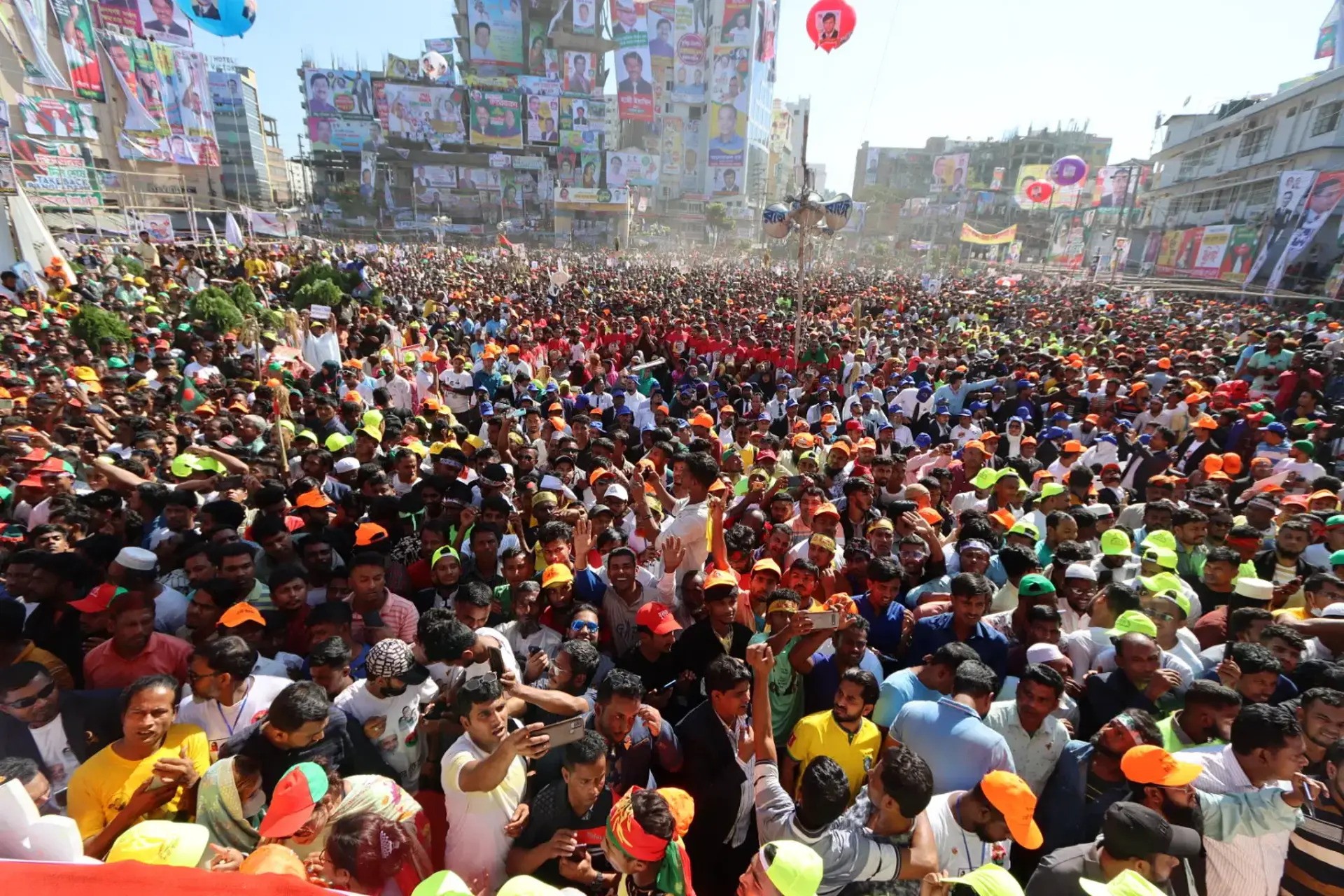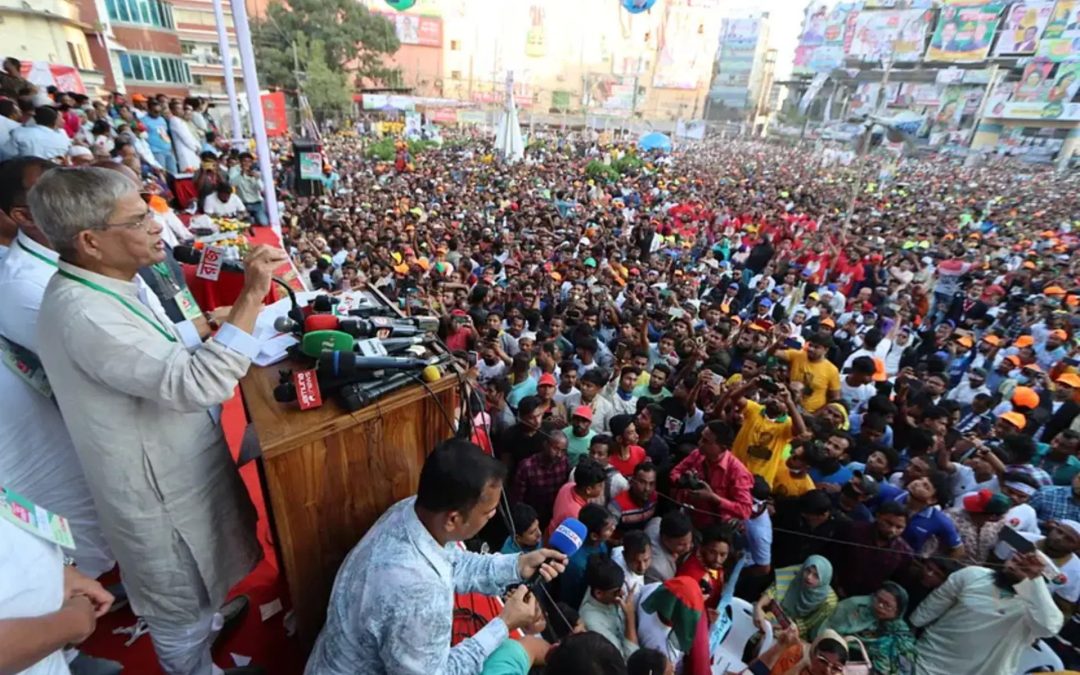On Saturday, the BNP held a branch mass meeting at the Comilla Town Hall field. Mirza Fakhrul Islam Alamgir was seen as the most important speaker|Photo: M Sadek
In the annals of history, every nation faces pivotal moments that test its resilience and the integrity of its governance.
For Bangladesh, November 2022 became a flashpoint, a moment etched in the collective consciousness as citizens grappled with the erosion of democratic values.
Speeches, protests, and growing frustrations illuminated the public’s call for justice, fairness, and a government that reflects their voice.
This article examines the fiery rhetoric of BNP Secretary General Mirza Fakhrul Islam Alamgir and the broader context of political upheaval during this time.
The Fight for Fair Elections
BNP Secretary General Mirza Fakhrul Islam Alamgir stood firm on one unyielding demand: elections under a neutral caretaker government.
Addressing a mass rally in Comilla on November 26, 2022, he emphasized that the Sheikh Hasina-led government must resign to pave the way for a fair electoral process.
Citing allegations of vote manipulation in the 2014 and 2018 elections, Mirza Fakhrul declared, “No election will occur without a caretaker government.”
His words echoed the sentiments of many who believe that Bangladesh’s electoral system is compromised under the current regime.
Fakhrul called for a “Durbar movement,” a relentless mass uprising, to reclaim the people’s right to choose their leaders.
The Price of Protest: Rising Tensions and Tragic Losses
The rally wasn’t just about words; it was rooted in bloodshed and sacrifice.
Mirza Fakhrul mourned the killing of Nayan, a local student leader, during efforts to mobilize support for the rally. “The fire in Nayan’s father’s eyes is burning across the nation,” Fakhrul said, symbolizing the collective anger of citizens fed up with the government’s 15-year rule.
This loss underscored a grim reality: dissent in Bangladesh often comes at a high price.
Reports of arrests, house-to-house raids, and enforced disappearances, especially as Dhaka’s mega rally loomed, painted a chilling picture of a government determined to suppress opposition at any cost.

People of Bangladesh
A multitude of leaders and workers from the neighboring districts of Comilla convened for the rally|Photo: M Sadek
Economic Struggles: The People’s Burden
Beyond political grievances, Mirza Fakhrul highlighted the economic struggles suffocating ordinary citizens.
The soaring prices of staples like rice, lentils, and cooking oil have exacerbated poverty and unrest.
While citizens struggled to make ends meet, Fakhrul accused the ruling Awami League of leveraging state resources for political gains, including a rally in Jessore attended by Prime Minister Sheikh Hasina.
“The people are ready to bid you farewell,” he quipped, urging the government to step aside for the nation’s benefit. The economic turmoil added urgency to the demand for change as citizens sought relief from policies they deemed exploitative.
Resonances of History: Charges of Aggression and Subjugation
Mirza Fakhrul and his BNP colleagues didn’t shy away from addressing the Awami League’s alleged role in political violence.
He accused the ruling party’s student wing, the Chhatra League, of orchestrating arson attacks and pinning the blame on the BNP.
Referencing the tragic disappearance of opposition leaders like Saiful Islam Hiru and Humayun Kabir Parvez, Fakhrul asked, “How long will children remain orphaned in search of their fathers?”
These allegations reflect a deeply polarized political landscape where trust in governance has eroded and the fight for justice feels like an uphill battle.
The Rallying Cry: A United Opposition
The mass rallies organized by the BNP across Bangladesh served as more than just platforms for speeches—they became symbols of resistance.
From Chittagong to Sylhet, each rally brought together thousands demanding the release of BNP Chairperson Khaleda Zia and the establishment of a non-partisan electoral process.
With upcoming rallies in Rajshahi and Dhaka, the opposition sought to amplify its message, uniting citizens against what they saw as systemic injustice.
As Fakhrul stated, “This election will not be like the ones before. The people will no longer allow their votes to be stolen.”
Verdict
Bangladesh is at a crossroads, with its future uncertain.
The fiery rhetoric of Mirza Fakhrul Islam Alamgir and the nationwide rallies reflect a growing demand for change—a call for democracy to triumph over authoritarianism.
This struggle isn’t just political; it’s a fight for the soul of the nation.
In these trying times, the collective voice of the people grows louder, demanding justice, fairness, and a government that serves its citizens.
The journey ahead is fraught with challenges, but history has shown that the will of a united populace can ignite change.
Bangladesh’s story is still being written, and its citizens are holding the pen.

